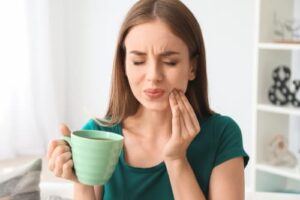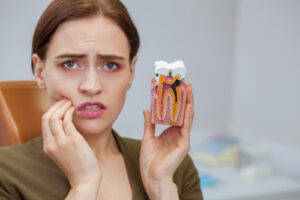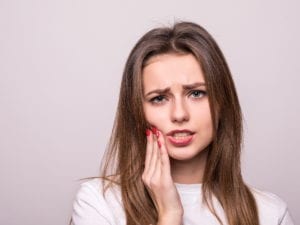
The Versatility of Porcelain Crowns
If there is a cosmetic dentistry and restorative dentistry treatment that almost does it all, it’s a porcelain crown. This restoration is the smart choice for functional and aesthetic complaints. Crafted to look like a natural tooth, a crown is customized to fit over an existing tooth to correct a host of problems. Cover Up […]
Continue Reading...
Dental Abscess? Call Your Bethesda Dentist Right Now
A dental abscess is a dental emergency. This serious oral health complication causes extreme pain, and the abscess itself is noticeable. While you might be tempted to wait it out, to see if the abscess pops on its own or, worse, try to burst it yourself, remember that this is not a blemish on your […]
Continue Reading...
4 Tooth Problems That Are Dental Emergencies
Dental emergencies are always inconvenient, often painful, and occasionally bloody. These experiences are frustrating and can be scary but when you know that your dentist is prepared to handle all types of dental emergencies, all you need to do is call. Whatever you do, don’t ignore any aches, pains, swelling, or broken teeth. When you […]
Continue Reading...
Things That Can Cause Toothaches
Persistent tooth pain can have a wide range of causes. Toothaches depend entirely on the source of the pain, and only your dentists will be able to determine what proper treatment is needed. From mild throbbing to unbearable pain, pain in your teeth requires prompt dental care. Here are some common reasons for toothaches and […]
Continue Reading...Wisdom Teeth
Wisdom teeth are the third and final set of molars that erupt in the back corners of the upper and lower normal adult mouth. Unfortunately, most people experience problems from wisdom teeth; in most cases, this is because the teeth erupt too close to existing permanent teeth, causing crowding, improper bites, and other problems. If […]
Continue Reading...Jaw Disorders
People who grind their teeth can sometimes develop a serious problem with their jaw, which left untreated, can adversely affect the teeth, gums and bone structures of the mouth. One of the most common jaw disorders is related to a problem with the temporomandibular joint, the joint that connects your lower jaw to your skull, […]
Continue Reading...Teeth Grinding (Bruxism)
Teeth grinding, also called bruxism, is often viewed as a harmless, though annoying, habit. Some people develop bruxism from an inability to deal with stress or anxiety. However, teeth grinding can literally transform your bite relationship and worse, severely damage your teeth and jaws over long periods of time. Teeth grinding can cause abrasion to […]
Continue Reading...Sensitive Teeth
If you wince with pain after sipping a hot cup of coffee or chewing a piece of ice, chances are that you suffer from “dentin hypersensitivity,” or more commonly, sensitive teeth. Hot and cold temperature changes cause your teeth to expand and contract. Over time, your teeth can develop microscopic cracks that allow these sensations […]
Continue Reading...Plaque
Plaque is a film of bacteria that forms on your teeth and gums after eating foods that produce acids. These foods may include carbohydrates (starches and sugars), such as candy and cookies, and starchy foods such as bread, crackers, and cereal. Tooth decay, commonly known as cavities, occurs when plaque remains on your teeth for […]
Continue Reading...Oral Cancer
Oral cancer is one of the most common cancers today and has one of the lowest survival rates, with thousands of new cases being reported each year. Fewer than half of all people diagnosed with oral cancer are ever cured. Moreover, people with many forms of cancer can develop complications—some of them chronic and painful—from […]
Continue Reading...Lacerations and Cuts
Any kind of cut to your face and the delicate soft tissues inside your mouth should be addressed immediately in order to prevent further tissue damage and infection. If a traumatic injury involves a broken facial bone such as the jaw, nose, chin or cheek, maxillofacial surgery may be required. With jaw surgery, rubber bands, […]
Continue Reading...Gum Disease (Gingivitis)
Gingivitis is the medical term for early gum disease, or periodontal disease. In general, gum disease can be caused by long-term exposure to plaque, the sticky but colorless film on teeth that forms after eating or sleeping. Gum disease originates in the gums, where infections form from harmful bacteria and other materials left behind from […]
Continue Reading...Fluorosis
Fluorosis is a condition in which your body has been exposed to too much fluoride. In normal doses (typically found in a safe drinking water system and an ADA-approved toothpaste), fluoride is a healthy compound that promotes strong teeth, which has the ability to fight cavities and other problems. But sometimes, fluorosis occurs when fluoride-containing […]
Continue Reading...Dry Mouth
Saliva is one of your body’s natural defenses against plaque because it acts to rinse your mouth of cavity-causing bacteria and other harmful materials. Dry mouth (also called Xerostomia) is a fairly common condition that is caused by diminished saliva production. People with medical conditions, such as an eating disorder or diabetes, are often plagued […]
Continue Reading...Diabetes
People living with diabetes are vulnerable to a host of systemic problems in their entire body. Unfortunately, the mouth and teeth are not immune from such problems, and many diabetics with oral problems go undiagnosed until conditions become advanced. Infections and other problems such as receding gums and gum disease, or periodontal disease, are common […]
Continue Reading...Cavities and Tooth Decay
What Is Tooth Decay? Tooth decay is caused by a variety of things; in medical terms, cavities are called caries, which are caused by long-term destructive forces acting on tooth structures such as enamel and the tooth’s inner dentin material. These destructive forces include frequent exposure to foods rich in sugar and carbohydrates. Soda, candy, […]
Continue Reading...Braces (Orthodontia)
Braces are applied to teeth for various reasons, including poorly aligned jaws, crooked, crowded and missing teeth, or a bad bite (also called malocclusion). Various things can cause teeth to become crooked or jaws misaligned, including thumb-sucking or a traumatic injury. Some conditions are inherited. Children between the ages of 7 and 14 are typical […]
Continue Reading...Canker/Cold Sores
People sometimes confuse canker sores and cold sores, but they are completely unrelated. Both can be painful, but knowing the differences can help you keep them in check. A canker sore is typically one that occurs on the delicate tissues inside your mouth. It is usually light-colored at its base and can have a red […]
Continue Reading...Bulimia Nervosa
People with eating disorders can suffer from oral health problems as well. This is because many of the behaviors associated with anorexia nervosa and bulimia nervosa—such as binge eating, self-induced vomiting, and use of diuretics or laxatives—cause changes in the mouth. For example, repeated episodes of vomiting, which is common in people with bulimia, release […]
Continue Reading...Bad Breath (halitosis)
An estimated sixty-five percent of Americans have bad breath. Over forty-million Americans have “chronic halitosis,” which is persistent bad breath. Ninety percent of all halitosis is of oral, not systemic, origin. Americans spend more than $1 billion a year on over the counter halitosis products, many of which are ineffective because they only mask the […]
Continue Reading...Abscessed Tooth
Treatment of an abscessed tooth An abscessed tooth is a pocket of pus, usually caused by some kind of infection and the spread of bacteria from the root of the tooth to the tissue just below or near the tooth. In general, a tooth that has become abscessed is one whose underlying pulp (the tooth’s […]
Continue Reading...



